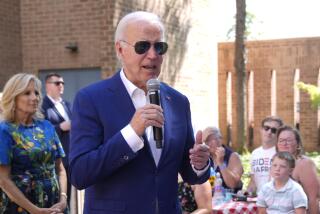Rostenkowski Tells Mayors They Won’t Share in ‘Peace Dividend’
- Share via
CHICAGO — A leading congressional Democrat bluntly told the nation’s mayors Monday that they stood no chance of getting billions--or even millions--more for urban programs from expected federal defense savings.
“There’s no money for such programs until the budget blockade is broken,” House Ways and Means Committee Chairman Dan Rostenkowski told the U.S. Conference of Mayors. “The ‘peace dividend’ is already going to be swallowed.”
Rostenkowski’s address to the more than 200 mayors discouraged a group that for three days had been making the case that cities need a multibillion-dollar infusion from the federal government to fight drugs, poverty, housing, education and other problems.
Rostenkowski came home to Chicago to tell the mayors they would be going it alone.
“Yours is not an easy task,” the congressman said in a speech blaming the Ronald Reagan Administration for most festering urban problems. He said also that Congress was far from ready to come to the aid of mayors and that taxpayers were unlikely to support higher taxes to help cities.
“He devastated everybody,” Boston Mayor Raymond Flynn said.
Later, the mayors heard a somewhat more encouraging talk from Sen. Bob Kerrey (D-Neb.). Still, even Kerrey said that “peace dividend” money will not “fall like manna from heaven” to cities. The mayors’ best hope is to sell their ideas to voters, much like Reagan sold his military buildup in the early 1980s, Kerrey said.
During the weekend, the mayors crafted an ambitious, costly plan for attacking urban problems.
The centerpiece of the plan was a demand that money from the programs come from expected defense cuts, with the mayors seeking half of whatever savings materialize. Rostenkowski’s speech, in effect, made much of the mayors’ new lobbying agenda appear moot even before it gets final approval Wednesday.
Rostenkowski said that he personally would support most of the mayors’ causes but he decided in advance of the speech not to offer an upbeat prognosis.
More to Read
Get the L.A. Times Politics newsletter
Deeply reported insights into legislation, politics and policy from Sacramento, Washington and beyond. In your inbox twice per week.
You may occasionally receive promotional content from the Los Angeles Times.









